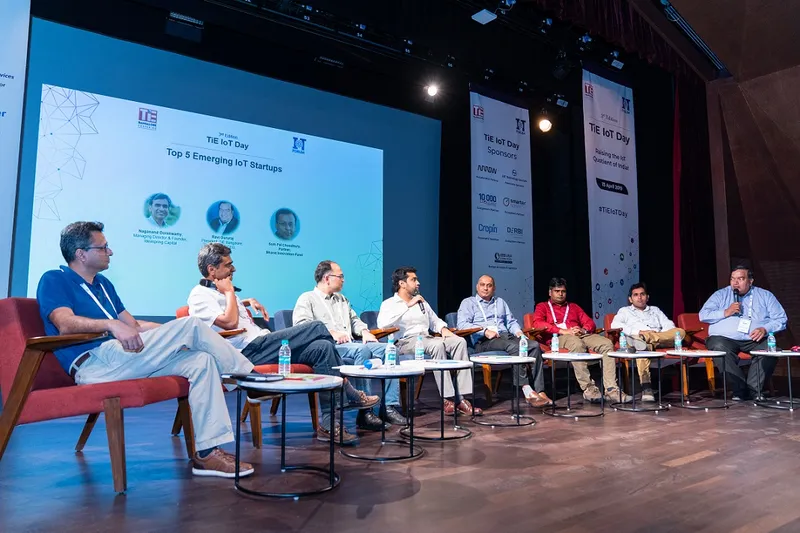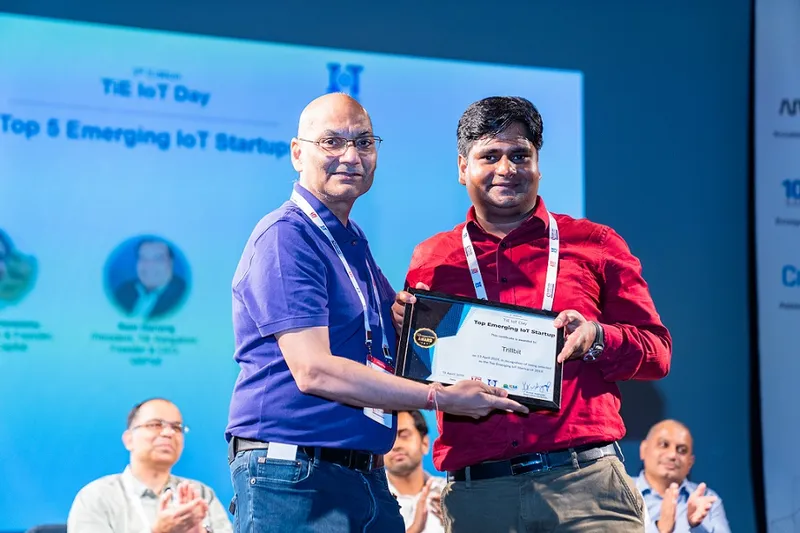IoT Day 2019: meet the top 5 emerging IoT startups of India
The annual IoT Day conference in Bangalore featured startups focusing on electric vehicles, counterfeit-proof technologies, proximity intelligence, robotic arm manipulation, and solar energy inverters.
After a day of keynote addresses, panel discussions and workshops, the third edition of TiE Bangalore’s annual IoT Day conference wrapped up by featuring the “Top 5 Emerging IoT Startups of India”. Founders of the following startups presented their innovations and business plans: Numocity, Noos Technologies, TrillBit, Vyuti, and ThingsCloud.

IoT startups with expert panel
Categories for submission of startup entries included tech-enabling solutions, analytics/AI-based solutions on sensor and real-world data, and core or edge infrastructure. Startups were judged according to the following criteria: solving a relevant market pain-point, innovative approach, sustainable business model, impact, competitive advantage, and team strength.
The entries were evaluated by the TiE IoTForum core team, headed by with Som Pal Chowdhury, Partner, Bharat Innovation Fund. See also YourStory’s coverage of the panel on ‘Scaling Startups,’ and earlier IoT activities by TiE Bangalore: IoT SIG, IoT Next Summit, IoT startup showcase, SMAC Day, IESA Vision Summit, and Smart Mobility.
Vyuti is a visual object intelligence provider for manipulation of objects by robotic arms. It can pick, orient, and place objects in various locations. With adequate training, the solution can be deployed in sectors as varied as manufacturing, construction, healthcare, and warehousing. While there are many solutions in the market for object recognition, there are few frameworks for dynamic object manipulation. Founded by NA Gokul, Vyuti is in talks with TVS, AMS, and Sansera for deployment.
Numocity is a platform for businesses in the electric vehicle ecosystem across the stages of generation, delivery, and consumption. Electric vehicle and battery manufacturers, energy providers, charging stations, and fleets can be connected via a transaction engine, distributed ledger, and an AI-based engine. Insights from the platform can be used for better fleet management, load distribution, driver behaviour insights, and even policy inputs for government. Founded by Ravikiran Annaswamy, Numocity was a member of Bosch’s DNA 2.0 Cohort in 2018 and is working with the company on EV fleet solutions.
TrillBit offers proximity intelligence by sound instead of costly methods like beacons or NFC. At frequencies beyond the human audible range, data can be transmitted via any loudspeaker and received by any smartphone. The solution needs no extra hardware; any app with the TrillBit SDK can decrypt the information. Applications include hyper-local marketing in malls, stadiums, and museums. Founded by Shashikant Burnwal, the startup has filed four patents and has conducted pilot trials with the Future Group and TicketGenie. It was also part of TechStar’s accelerator programme in Boston.
ThingsCloud offers solar inverter solutions for residential energy systems. This makes it easier for residential solar providers to monetise excess energy generated and store backup power for use during grid outages. The solution by ThingsCloud also provides AI-based insights for predicting supply and demand. Founded by Amruth Puttapa, the company’s inverters are on sale in Bengaluru, Coimbatore, and Kadappa.
Noos Technologies offers counterfeit-proof solutions for brand protection and tracking. Founded by Koushik Banerjee, the startup has built packaging security technology that can be verified via a smartphone. An estimated $150 billion is spent annually on security of packages to detect and prevent tampering. The proprietary technology by Noos is based on dynamic digital signature generation and goes beyond the capabilities of current solutions like holograms, QR codes, and NFC. The startup has seed funding from SINE (IIT Bombay), Intel, and DST.
The five founders shared insights from their journeys in a concluding panel, along with Ravi Gururaj, President of TiE Bangalore; Naganand Doraiswamy, Founder of IdeaSpring Capital; and Som Pal Choudhury, Partner at Bharat Innovation Fund.
For example, many large firms and investors still think of India largely as a services provider and not a product innovator. China has a manufacturing edge in the electric vehicle industry thanks to the fact that many precious metals needed are found in the country; India’s edge will have to be in software innovation, platform design, and business models.
The electric vehicle industry needs to come together and standardise on the specifications and design of plug points at charging stations. There seem to be three different kinds of plugs. India’s electric vehicle policy seems to be focussed more on large automobile firms than on emerging startups. There also needs to be a policy for robotics in India, just as there is a policy for drones, the speakers recommended.
Arvind Tiwari, Chair of the TiE IoT Forum, advises startups to select the industry or IoT stack after assessing the market properly. “Think carefully on the business model. Good price points or subscription are key, and they need to be engineered appropriately,” he suggests.
It is also important to form partnerships. Many startups are doing focused solutions and can be leveraged. "There is no need to build all of the nine yards yourself,” Arvind sums up.

Also read: IoT Innovation Accelerator launched for AgriTech, CleanTech, CivicTech and HealthTech startups







![[Watch] Ninjacart Co-founder Thiru chalks out his journey in inventing the wheel for fresh produce ecommerce](https://images.yourstory.com/cs/2/a182c7e0140711e987e2f7248b252f46/Capture51570470464543PNG?mode=crop&crop=faces&ar=1%3A1&format=auto&w=1920&q=75)